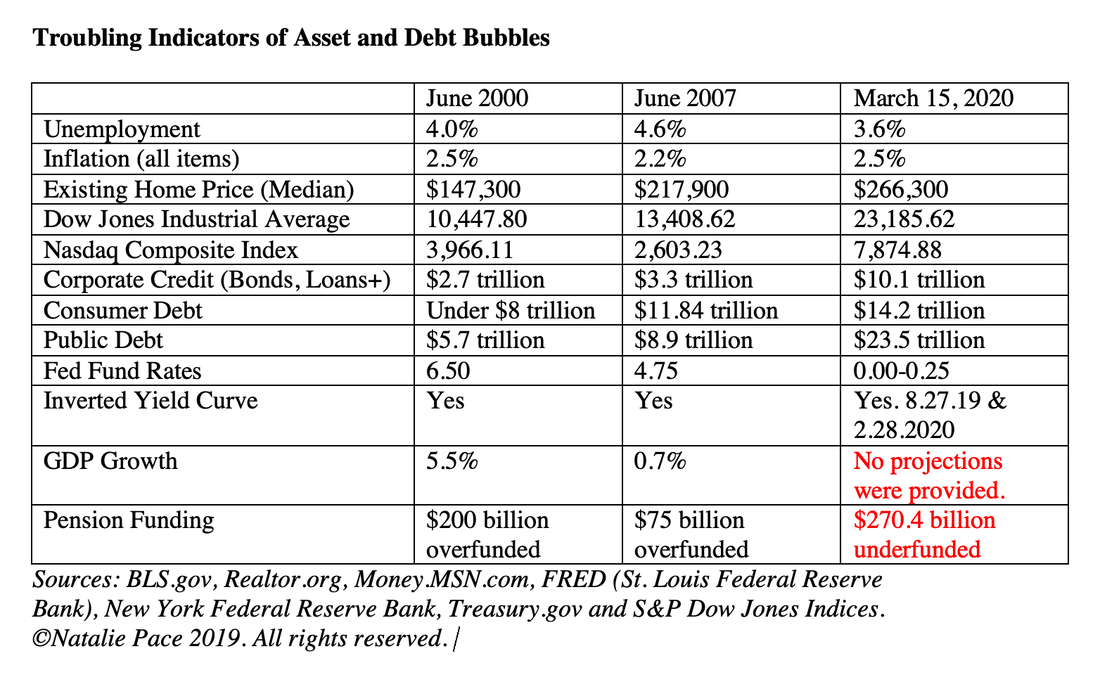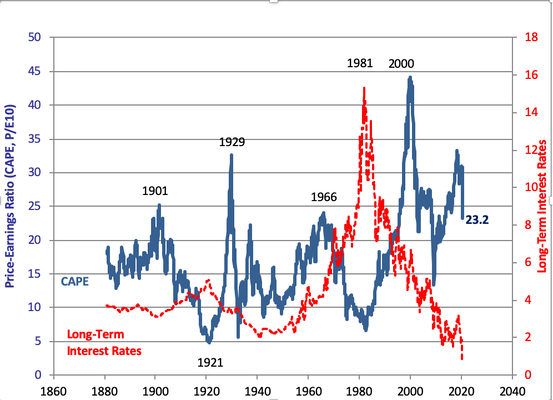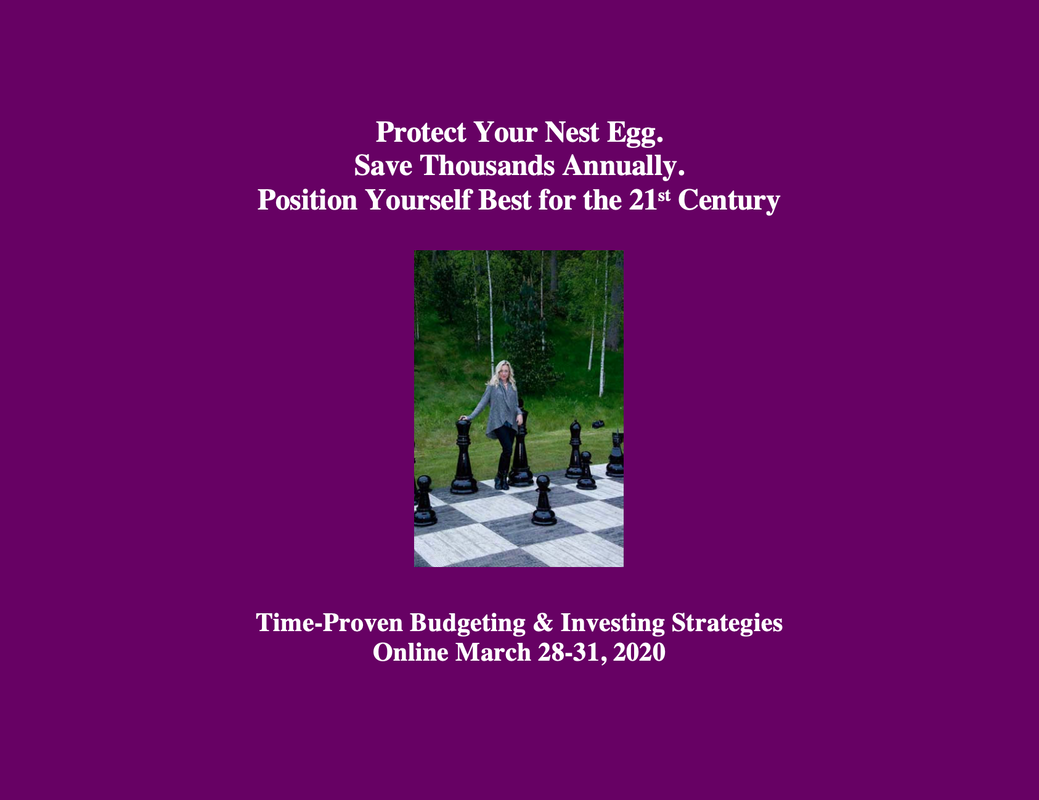 Natalie Pace is the author of The ABCs of Money, The ABCs of Money for College, The Gratitude Game and Put Your Money Where Your Heart Is. Natalie Pace is the author of The ABCs of Money, The ABCs of Money for College, The Gratitude Game and Put Your Money Where Your Heart Is. I recently spoke to somebody whose broker-salesman had told her that bond funds will go up when the markets go down. She’s already lost hundreds of thousands of dollars on that idea. “So… when will I start making money?” she asked him. After more confusing sales-speak from her advisor, she finally called our offices. The Old Rules Don’t Apply. Stocks are losing money. Bonds are losing money. Money market funds have redemption gates and liquidity fees. Annuity providers and insurance companies are vulnerable. Mortgage backed securities are asking for a bailout. Even Treasury bills have had liquidity issues. Policy Impotence There are two problems with bonds in the Coronavirus Recession. First of all, interest rates are at zero, so there is no room for the Feds to cut. This is something that Jerome Powell, the Federal Reserve Board chairman has been warning about for years. In his most recent testimony before Congress on February 11, 2020, he testified, “This low interest rate environment may limit the ability of central banks to reduce policy interest rates enough to support the economy during a downturn.” As you can see in the chart below, in the prior two recessions interest rates started out much higher. It was easy to get safe in bonds in 2000 and 2008. When the recession hit, the Federal Reserve cut interest rates. That action helped the bond value go up, and the safe side of your nest egg perform well. Bonds were one of the best performing assets in 2001, during the Dot Com Recession. All of that changed in 2009. Central bank interest rates dropped to zero, or negative, and stayed there for the next decade to stimulate the economy during the Great Recession. The Federal Reserve Board and the White House Administration fought very publicly about the need to raise interest rates in 2018. When the Federal Open Market Committee (FOMC) bumped rates up to a mere 2.25-2.5% in December of 2018, the U.S. had the worst December on Wall Street since the Great Depression. Over-Leverage and Creditworthiness The other problem with bonds is over-leverage. Over 50% of corporate bonds are congregated just above junk bond status. This has been the case for months – well before the coronavirus crisis. There was simply no downside to going that low. Corporations could still borrow money very cheaply – in the 5-6% range. When I was discussing this with MacArthur genius award winner Kevin Murphy a few months ago, he said, “If you think the corporate bonds are scary, the municipal bonds are downright terrifying.” Your investment grade bonds can include a lot of bonds that are vulnerable to being downgraded to junk. Many investment grade bond funds can include up to 20% of junk. At least 10% of the speculative bonds are expected to default in the wake of the coronavirus crisis. Credit was not available to these vulnerable companies over the weekend of March 14-15, 2020, which is why the Federal Reserve Board stepped in with their first wave of bail-outs. Jerome Powell admitted in his press conference briefing that “The cost of credit has risen for all but the strongest borrowers.” In short, bonds are vulnerable to capital loss. The safe side of your portfolio is there to protect you from losses. If bonds can’t do that, then you need to find a strategy that will. (I spend one full day discussing what’s safe in my 3-day Investor Educational Retreats. I’ve been hosting them online every weekend since this crisis hit.) Stocks. The Coronavirus Recession set the record for the fastest that a bull market became a bear – ever (source S&P Dow Jones Indices). This has a lot to do with the amount of debt in the world, and also that stocks were in a bubble. Again, all of this was a problem before the coronavirus crisis hit. Robert Schiller has been saying since at least 2018, that the only two times that price to earnings ratios have been higher was in 1929 and in 2000. As you probably recognize, 1929 was right before the Great Depression. Between the highs of March 2000 and the lows of October 2002, the NASDAQ Composite Index lost 78%. The index took about 15 years to crawl back to even. Robert Shiller CAPE Ratio Chart March 24, 2020 Annuities and Life Insurance Aren’t as Safe as You Think Either In an interview on CNBC, Warren Buffett recently warned that annuity providers and insurance companies get into trouble when interest rates get cut. Why? If they have promised you even something as low as a 3% return, and Treasury bills are now paying nothing, they have no profitability. They also get into trouble because these companies invest in equities. When stocks drop, they have losses. These are two of the contributors to the bailout of the insurance industry in the Great Recession. There are more. In 2008, AIG was also caught in the Collateralized Debt Obligations (CDO) and Structured Investment Vehicles (SIV) implosion. Annuities and insurance companies are not FDIC-insured. So, if the company gets into trouble, you don’t have a lot of recourse to get your money back other than State Guarantee funds. The safety net will be much lower than you’ve been promised. And those funds will be overwhelmed if many annuity customers and insurance policyholders need help at the same time. It’s a safer bet to keep your own money than to reach for yield. As Roy Rogers was fond of saying, “I’m more concerned with the return of my money than the return on my money.” Money Market Funds Money market funds have redemption gates and liquidity fees. They offer banks, insurance companies and brokerages a “bail-in” plan on your dime, if financial services get into trouble. (Hint: they are in trouble. The U.S. stock market has lost 30% since the highs set on February 19, 2020.) As I mentioned, there was a liquidity crisis that forced the Federal Open Market Committee to have an emergency meeting over the weekend on March 14-15, 2020 – a few days before its regularly scheduled meeting. At that time, the FOMC took a number of extreme actions to jumpstart Treasury bills, money market funds, bonds and other areas where liquidity had dried up. According to Federal Reserve Board Chairman Jerome Powell, in his statement before the press conference on March 15, 2020, “In the past week, several important financial markets, including the market for U.S. Treasury securities, have at times shown signs of stress and impaired liquidity.” The Bottom Line There is just too much debt in the world. We were borrowing from Peter to pay Paul in every corner. Consumer debt is higher than ever. Student loan debt is crushing Millennials. Corporate debt is staggering. Public debt is absolutely astronomical. (See the chart above.) Real Estate prices have actually been coming down since July of 2019. However, they are still unaffordable in 71% of cities. It’s very important to understand how to properly protect your wealth. Market timing doesn’t work. (Most people sell low, and buy high.) Blind faith cost Main Street investors more than half of their wealth in the last two recessions. Buy & Hope worked better in the 20th Century than it has in the 21st Century. Since 2000, B&H investors have been riding the Wall Street rollercoaster, losing more than half in the recessions and then spending most of the bull market crawling back to even. There are time-proven strategies that earned gains in the last two recessions and have outperformed the bull markets in between. This time around, in addition to being properly diversified and keeping an appropriate amount safe, you’ll also need to know what’s safe in a world where bonds are losing money, annuities are risky and money market funds have redemption gates and liquidity fees. Since we’re all in quarantine, why not join us and learn the ABCs of Money that we all should have received in high school. We live in the 21st Century. Last century strategies don’t work. The sooner you adapt, the faster your life transforms. The Thrive Budget and Easy as a Pie Chart Nest Egg Strategies will be essential tools for a post coronavirus world. March 28-31, 2020 Online Investor Retreat Our most affordable Easy access… Other Blogs of Interest Tomorrow is Going to be Another Tough Day. Price Matters. Stock Prices are Still Too High. Should You Ride Things Out? 7 Recession Indicators Corona Virus Update. The Bank Bail-in Plan on Your Dime. NASDAQ is Up 6X. CoronaVirus: Which Companies and Countries Will be Most Impacted. Is Tesla Worth GM and Ford Combined. Artificial Intelligence is on Fire. Is it Time to Buy S'More? Take the Retirement Challenge. 2020 Investor IQ Test. Answers to the 2020 Investor IQ Test. Win a Seat at a Retreat The Cannabis Capital Crunch and Stock Meltdown. Does Your Commute Pollute More Than Planes? Are Health Care Costs Killing Your Budget? 2020 Crystal Ball. The Benefits of Living Green. Featuring H.R.H. The Prince of Wales' Twin Eco Communities. What Love, Time and Charity Have to do with our Commonwealth. Interview with MacArthur Genius Award Winner Kevin Murphy. Unicorns Yesterday. Fairy Tales Today. IPO Losses Top $100 Billion. Counting Blessings on Thanksgiving. Real Estate Prices Decline. Hong Kong Slides into a Recession. China Slows. They Trusted Him. Now He Doesn't Return Phone Calls. Beyond Meat's Shares Dive 67% in 2 Months. Price Matters. Will There be a Santa Rally? It's Up to Apple. Will JP Morgan Implode on Fairy Tales and Unicorns. Harness Your Emotions for Successful Investing. What the Ford Downgrade Means for Main Street. The Dow Dropped Over 1000 Points Tesla's 3Q 2019 Deliveries Could Hit 100,000. Do We Talk Ourselves into Recessions? Interview with Nobel Prize Winning Economist Robert J. Shiller. The Winners and Loser of a Clean Energy Policy. Make the Climate Strike Personal. Ford is Downgraded to Junk. From Buried Alive in Bill to Buying Your Own Island. The Manufacturing Recession. An Interview with Liz Ann Sonders. Gold Mining ETFs Have Doubled. The Gold Bull Market Has Begun. The We Work IPO. The Highs and Hangovers of Investing in Cannabis. Recession Proof Your Life. China Takes a Bite Out of Apple Sales. Will the Dow Hit 30,000? A Check Up on the Economy Red Flags in the Boeing 2Q 2019 Earnings Report The Weakening Economy. Think Capture Gains, Not Stop Losses. Buy and Hold Works. Right? Wall Street Secrets Your Broker Isn't Telling You. Unaffordability: The Unspoken Housing Crisis in America. Are You Being Pressured to Buy a Home or Stocks? What's Your Exit Strategy? Will the Feds Lower Interest Rates on June 19, 2019? Should You Buy Tesla at a 2 1/2 Year Low? It's Time To Do Your Annual Rebalancing. Cannabis Crashes. Should You Get High Again? Are You Suffering From Buy High, Sell Low Mentality? Financial Engineering is Not Real Growth The Zoom IPO. 10 Rally Killers. Fix the Roof While the Sun is Shining. Uber vs. Lyft. Which IPO Will Drive Returns? Boeing Cuts 737 Production by 20%. Tesla Delivery Data Disappoints. Stock Tanks. Why Did Wells Fargo's CEO Get the Boot? Earth Gratitude This Earth Day. Real Estate is Back to an All-Time High. Is the Spring Rally Over? The Lyft IPO Hits Wall Street. Should you take a ride? Cannabis Doubles. Did you miss the party? 12 Investing Mistakes Drowning in Debt? Get Solutions. What's Hot in 2019? The Debt Ceiling Was Hit (Again) on March 1, 2019. How Bad Will the GDP Report Be? 2019 Investor IQ Test The State of the Union CBD Oil for Sale. The High Cost of Free Advice. Apple's Real Problem in China: Huawei. 2019 Crystal Ball. 2018 is the Worst December Ever. Will the Feds Raise Interest Rates? Should They? Learn what you're not being told in the MSM. Why FANG, Banks and Your Value Funds Are in Trouble. When the Santa Rally is a Loser, the Next Year is a Bigger Loser. Russia Dumps Treasuries and Buys Gold OPEC and Russia Cut Oil Production. Important Disclaimers Please note: Natalie Pace does not act or operate like a broker. She reports on financial news, and is one of the most trusted sources of financial literacy, education and forensic analysis in the world. Natalie Pace educates and informs individual investors to give investors a competitive edge in their personal decision-making. Any publicly traded companies or funds mentioned by Natalie Pace are not intended to be buy or sell recommendations. ALWAYS do your research and consult an experienced, reputable financial professional before buying or selling any security, and consider your long-term goals and strategies. Investors should NOT be all in on any asset class or individual stocks. Your retirement plan should reflect a diversified strategy, which has been designed with the assistance of a financial professional who is familiar with your goals, risk tolerance, tax needs and more. The "trading" portion of your portfolio should be a very small part of your investment strategy, and the amount of money you invest into individual companies should never be greater than your experience, wisdom, knowledge and patience. Information has been obtained from sources believed to be reliable however NataliePace.com does not warrant its completeness or accuracy. Opinions constitute our judgment as of the date of this publication and are subject to change without notice. This material is not intended as an offer or solicitation for the purchase or sale of any financial instrument. Securities, financial instruments or strategies mentioned herein may not be suitable for all investors. Comments are closed.
|
AuthorNatalie Pace is the co-creator of the Earth Gratitude Project and the author of The Power of 8 Billion: It's Up to Us, The ABCs of Money, The ABCs of Money for College, The Gratitude Game and Put Your Money Where Your Heart Is. She is a repeat guest & speaker on national news shows and stages. She has been ranked the No. 1 stock picker, above over 830 A-list pundits, by an independent tracking agency, and has been saving homes and nest eggs since 1999. Archives
July 2024
Categories |









 RSS Feed
RSS Feed